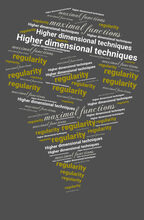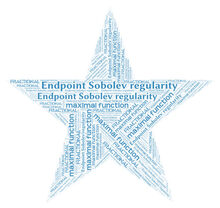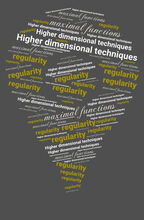Past Events
FALL 2021 Nonlinear Analysis Special Lecture Part 2 of 2
2021-12-15Mr. Julian Weigt, Aalto University
Title: Higher dimensional techniques for the regularity of maximal functions
Abstract:
It has been an open question if maximal operators M satisfy the endpoint regularity bound \(mathop{\mathrm{var}}(Mf) \leq C \mathop{\mathrm{var}}(f)\). So far the majority of the known results has been in one dimension. I give an overview of the progress on this question with a focus on the techniques. Next I present the techniques used in the recent proofs of \(mathop{\mathrm{var}}(Mf) \leq C \mathop{\mathrm{var}}(f)\) for several maximal operators in higher dimensions. They are mostly geometric measure theoretic in the spirit of the relative isoperimetric inequality and involve a stopping time and various covering arguments.
Please click here to register
*After registering, you will receive a confirmation email containing information about joining the meeting.
FALL 2021 Nonlinear Analysis Seminar Series
2021-12-14Dr. David Beltran, University of Wisconsin – Madison Title: Endpoint Sobolev regularity of the fractional maximal function Abstract: Abstract: I will report some of the recent progress regarding the boundedness and continuity of the map \(f \mapsto |\nabla M_\beta f|\) from the endpoint space \(W^{1,1}(\mathbb{R}^d)\) to \(L^{d/(d-\beta)}(\mathbb{R}^d)\), where \($M_\beta\) denotes the fractional version of either the centered or uncentered Hardy--Littlewood maximal function. After contributions by several authors, the problem is now totally solved in an affirmative way. I will focus on my contributions, which correspond to the radial case (in joint work with J. Madrid), and also to the general case for the continuity of the map (in joint work with C. González-Riquelme, J. Madrid and J. Weigt). Please click here to register *After registering, you will receive a confirmation email containing information about joining the meeting.
Please click here to register
*After registering, you will receive a confirmation email containing information about joining the meeting.
FALL 2021 Nonlinear Analysis Special Lecture Part 1 of 2
2021-12-13Mr. Julian Weigt, Aalto University
Title: Higher dimensional techniques for the regularity of maximal functions
Abstract:
It has been an open question if maximal operators M satisfy the endpoint regularity bound \(mathop{\mathrm{var}}(Mf) \leq C \mathop{\mathrm{var}}(f)\). So far the majority of the known results has been in one dimension. I give an overview of the progress on this question with a focus on the techniques. Next I present the techniques used in the recent proofs of \(mathop{\mathrm{var}}(Mf) \leq C \mathop{\mathrm{var}}(f)\) for several maximal operators in higher dimensions. They are mostly geometric measure theoretic in the spirit of the relative isoperimetric inequality and involve a stopping time and various covering arguments.
Please click here to register
*After registering, you will receive a confirmation email containing information about joining the meeting.
FALL 2021 Nonlinear Analysis Special Lecture Part 3 of 3
2021-12-08Associate Professor Kabe Moen, The University of Alabama
Title: Fractional Integrals and weights Part III
Abstract:
In this talk we will cover the two weight inequalities for the fractional integral operator and related fractional maximal operator. We will discuss the background of two-weight inequalities and Sawyer’s testing conditions and two weight characterization. We will also discuss bump conditions and some open questions.
Please click here to register
*After registering, you will receive a confirmation email containing information about joining the meeting.
FALL 2021 Nonlinear Analysis Seminar Series
2021-12-07★DISTINGUISHED LECTURE
Professor Yoshikazu Giga, The University of Tokyo
Title: On a singular limit of a single-well Modica-Mortola functional and its applications
Abstract:
It is important to describe the motion of phase boundaries by macroscopic energy in the process of phase transitions. Typical energy describing the phenomena is the van der Waals energy, which is also called a Modica-Mortola functional with a double-well potential or the Allen-Cahn functional. It turns out that it is also important to consider the Modica-Mortola functional with a single-well potential since it is often used in various settings including the Kobayashi-Warren-Carter energy, which is popular in materials science. It is very fundamental to understand the singular limit of such a type of energies as the thickness parameter of a diffuse interface tends to zero. In the case of double-well potentials, such a problem is well-studied and it is formulated, for example, as the Gamma limit under
convergence.
However, if one considers the Modica-Mortola functional, it turns out that
convergence is too rough even in the one-dimensional problem.
We characterize the Gamma limit of a single-well Modica-Mortola functional under the topology which is finer than
topology. In a one-dimensional case, we take the graph convergence. In higher-dimensional cases, it is more involved. As an application, we give an explicit representation of a singular limit of the Kobayashi-Warren-Carter energy. Since the higher-dimensional cases can be reduced to the one-dimensional case by a slicing argument, studying the one-dimensional case is very fundamental. A key idea to study the one-dimensional case is to introduce “an unfolding of a function” by changing an independent variable by the arc-length parameter of its graph. This is based on a joint work with Jun Okamoto (The University of Tokyo), Masaaki Uesaka (The University of Tokyo, Arithmer Inc.), and Koya Sakakibara (Okayama University of Science, RIKEN).
Please click here to register
*After registering, you will receive a confirmation email containing information about joining the meeting.
FALL 2021 Nonlinear Analysis Special Lecture Part 2 of 3
2021-12-01Associate Professor Kabe Moen, The University of Alabama
Title: Fractional Integrals and weights Part II
Abstract:
In this talk we will cover the one weight inequalities for the fractional integral operator and related fractional maximal operator. We will discuss the background of A_p weights and A_{p,q} weights and go over the dyadic decomposition of the fractional integral operator. We will also cover auxiliary results like sharp constants and.
Please click here to register
*After registering, you will receive a confirmation email containing information about joining the meeting.
FALL 2021 Nonlinear Analysis Seminar Series
2021-11-30Dr. Po Lam Yung, Australian National University
Title: Sobolev norms revisited
Abstract:
In this talk, we will describe some new ways of characterising Sobolev norms, using sizes of superlevel sets of suitable difference quotients. They provide remedy in certain cases where some critical Gagliardo-Nirenberg interpolation inequalities fail, and lead us to investigate real interpolations of certain fractional Besov spaces. Some connections will be drawn to earlier work by Bourgain, Brezis and Mironescu. Joint work with Haim Brezis, Jean Van Schaftingen, Qingsong Gu, Andreas Seeger and Brian Street.
Please click here to register
*After registering, you will receive a confirmation email containing information about joining the meeting.
FALL 2021 Nonlinear Analysis Special Lecture Part 1 of 3
2021-11-24Wednesday 10th November 2021, 10:00–11:00 JST (UTC+9), online on Zoom
Associate Professor Kabe Moen, The University of Alabama
Title: Fractional Integrals and weights Part I
Abstract:
I will introduce fractional integral operator and its related maximal operator. After developing some of the relevant background, we will discuss its boundedness on Lebesgue spaces and various related inequalities of Hedberg and Welland. We will also cover endpoint bounds and applications to Sobolev-Poincare inequalities.
Please click here to register
*After registering, you will receive a confirmation email containing information about joining the meeting.
FALL 2021 Nonlinear Analysis Seminar Series
2021-11-16Professor Galia Dafni, Concordia University
Title: Boundedness and continuity of rearrangements in BMO and VMO
Abstract:
Joint work with Almut Burchard (Toronto) and Ryan Gibara (Cincinnati). Let \(f\) be a function of bounded mean oscillation (BMO) on cubes in \(\mathbb{R}^n\), \(n > 1\). If \(f\) is rearrangeable, we show that its symmetric decreasing rearrangement\(Sf\) belongs to \(\mathrm{BMO}(\mathbb{R}^n)\). We also improve the bounds for the decreasing rearrangement \(f^*\) by Bennett, DeVore and Sharpley, \(\|f^*\|_{ \mathrm{BMO}(\mathbb{R}_+)} \leq C_n\|f\| _{\mathrm{BMO}(\mathbb{R}^n)}\), by eliminating the exponential dependence of \(C_n\) on the dimension \(n\). The key is to switch from cubes to a comparable family of shapes. Using a family of rectangles that is preserved under bisections, one can prove a dimension-free Calder\'on-Zygmund decomposition, and the boundedness of the decreasing rearrangement with the same constant. Restricting to the subspace of functions of vanishing mean oscillation (VMO), we show that these rearrangements take VMO functions to VMO functions. Furthermore, while the map from \(f\) to \(f^*\) is not continuous in the BMO seminorm, we prove continuity when the limit is in VMO.
Please click here to register
*After registering, you will receive a confirmation email containing information about joining the meeting.
FALL 2021 Nonlinear Analysis Seminar Series
2021-11-09Tuesday 9th November 2021, 16:00–17:00 JST (UTC+9), online on Zoom
Professor Denis Serre, The UMPA
Title: Compensated integrability: classical and singular Divergence-BV symmetric tensors
Abstract:
Compensated Integrability is a recent tool of Functional Analysis, which extends both the Gagliardo Inequality and the Isoperimetric Inequality. It concerns the determinant of positive symmetric tensors whose row-wise Divergence is controlled in the space of bounded measures. It is somehow dual to Brenier's Theorem of Optimal Transport. Its applications cover several domains in Mathematical Physics and in Differential Geometry.













